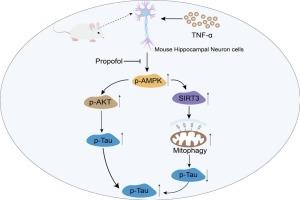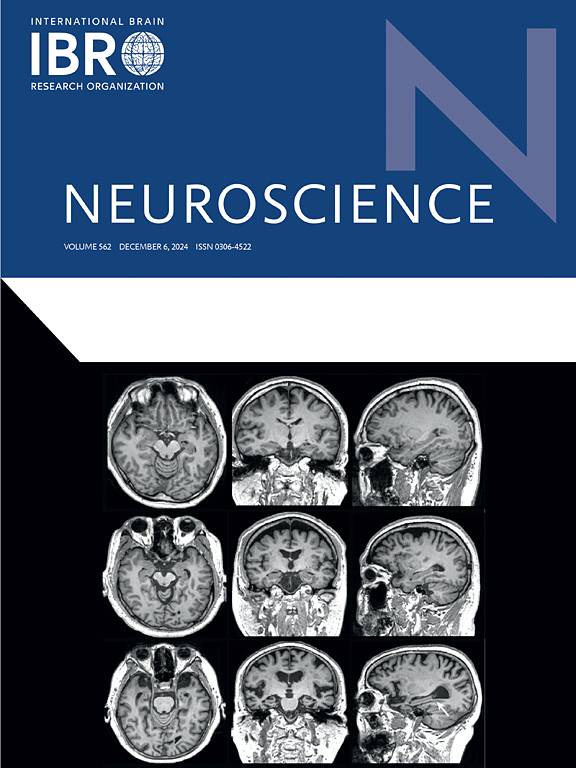The study of beneficial effect and mechanism of propofol on TNF-α-induced p-Tau increase in HT22 hippocampal neurons
IF 2.8
3区 医学
Q2 NEUROSCIENCES
引用次数: 0
Abstract
Background
Tau protein is a soluble microtubule-binding protein expressed in neurons. Abnormal post-translational modifications, such as hyperphosphorylation, are closely related to central nervous system inflammation and may lead to neuronal damage. Propofol has been shown to exert neuroprotective effects. In this study, we investigated the effects of propofol on TNF-α-induced p-Tau increase in hippocampal neurons and explored the underlying mechanisms.
Methods
HT22 hippocampal neurons were pretreated with propofol, and then stimulated with TNF-α. Cell viability was measured by cell counting kit-8 (CCK-8). The expression and phosphorylation of Tau, AMPK, AKT and the expression of SIRT3 were detected by Western blot. Mitophagy was detected through the mitophagy detection kit and confocal imaging of LC3B localization.
Results
TNF-α enhanced Tau phosphorylation in a time- and dose-dependent manner, and significant effects were observed at 10 ng/mL for 2 h. Pretreatment with 25 μM propofol for 1 h effectively reduced TNF-α-induced Tau phosphorylation. TNF-α activated the phosphorylation of AMPK and AKT, which was attenuated by propofol pretreatment and by AMPK inhibitor (Compound C) or AKT inhibitor (MK2206). Meanwhile, TNF-α promoted mitophagy and upregulated the expression of SIRT3, which was inhibited by propofol and by SIRT3 inhibitor (3-TYP).
Conclusions
Propofol may attenuate TNF-α-induced p-Tau expression in HT22 cells through modulation of the AMPK/AKT signaling pathway, and may inhibit TNF-α-enhanced mitophagy by affecting the AMPK/SIRT3 signaling pathway.

异丙酚对TNF-α-诱导的HT22海马神经元p-Tau升高的有益作用及机制研究。
背景:Tau蛋白是一种在神经元中表达的可溶性微管结合蛋白。异常的翻译后修饰,如过度磷酸化,与中枢神经系统炎症密切相关,并可能导致神经元损伤。异丙酚已被证明具有神经保护作用。在本研究中,我们研究了异丙酚对TNF-α-诱导的海马神经元p-Tau升高的影响,并探讨了其潜在机制。方法:用异丙酚预处理HT22海马神经元,再用TNF-α刺激。采用细胞计数试剂盒-8 (CCK-8)测定细胞活力。Western blot检测Tau、AMPK、AKT的表达和磷酸化水平以及SIRT3的表达。通过线粒体自噬检测试剂盒和LC3B定位共聚焦成像检测线粒体自噬。结果:TNF-α以时间和剂量依赖的方式增强Tau磷酸化,10 ng/mL作用2 h,效果显著。25 μM异丙酚预处理1 h可有效降低TNF-α-诱导的Tau磷酸化。TNF-α激活AMPK和AKT的磷酸化,异丙酚预处理和AMPK抑制剂(化合物C)或AKT抑制剂(MK2206)可减弱AMPK和AKT的磷酸化。同时,TNF-α促进线粒体自噬,上调SIRT3的表达,而异丙酚和SIRT3抑制剂(3-TYP)可抑制SIRT3的表达。结论:异丙酚可能通过调节AMPK/AKT信号通路减弱TNF-α诱导的HT22细胞p-Tau的表达,并可能通过影响AMPK/SIRT3信号通路抑制TNF-α增强的线粒体自噬。
本文章由计算机程序翻译,如有差异,请以英文原文为准。
求助全文
约1分钟内获得全文
求助全文
来源期刊

Neuroscience
医学-神经科学
CiteScore
6.20
自引率
0.00%
发文量
394
审稿时长
52 days
期刊介绍:
Neuroscience publishes papers describing the results of original research on any aspect of the scientific study of the nervous system. Any paper, however short, will be considered for publication provided that it reports significant, new and carefully confirmed findings with full experimental details.
 求助内容:
求助内容: 应助结果提醒方式:
应助结果提醒方式:


